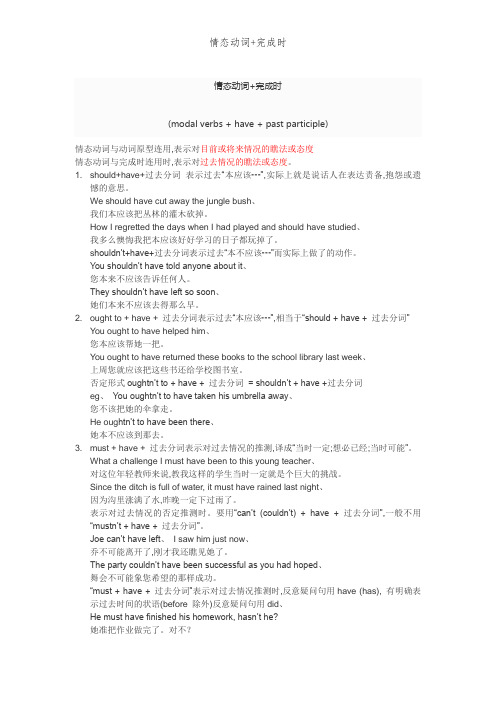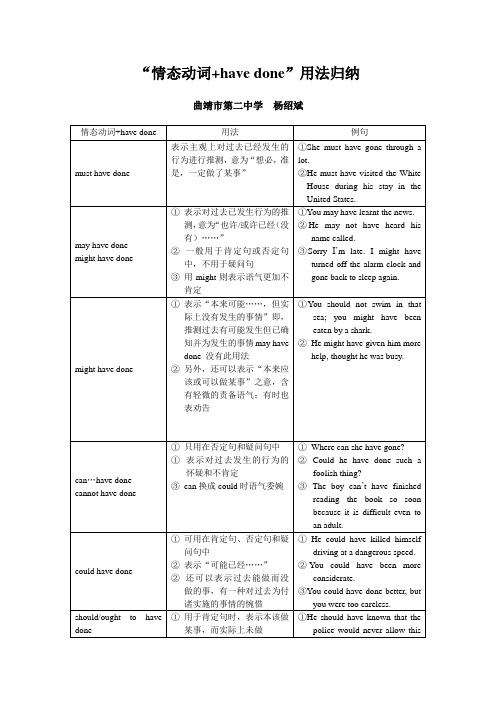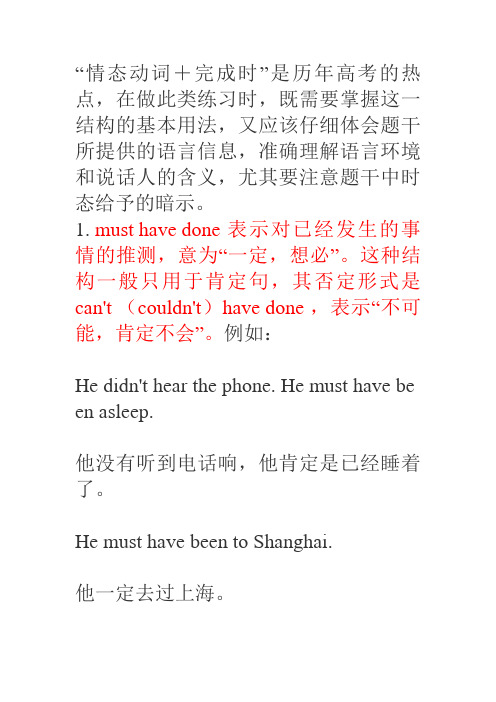情态动词+完成时
- 格式:docx
- 大小:17.66 KB
- 文档页数:4

六-5单元完成时态和情态动词用法1.⑴现在完成时态表示①过去所发生或完成的动作对现在造成的影响或结果。
②表示过去所发生的动作一直持续到现在。
⑵现在完成时态构成:主语+have\has+v-ed(动词过去分词)+其它。
⑶句式:肯定句式主语+have\has+v-ed 否定句式:主语+have n′t\hasn′t +词过去分词一般疑问句:Have\Has + 主语 + V-ed .....?特殊疑问句:疑问词+have\has+ 主语+ V-ed…?⑷时间词:already(完成肯句中)ever(疑问句中)never,yet(疑问句,否句末),since+时点,since+时段+ago,since+从句(一过),by+时点,so far(到目前为止)⑸过去分词的构成:1.一般情况下直接+ed, 2.以字母e结尾的直接+d 3.以辅音字母+y结尾的变Y为i再加ed 4.双写+ed 如:1.stay-ed 2.live-d3.study-studied carry-carried4.stop-stopped2.过去完成时态:,①表示动作发生在过去的过去,对过去所造成的影响或结果,②表示动作发生在过去的过去,一直持续到过去。
过去完成时态构成:主语+had+V-ed否定句式一般疑问句过去完成时态经常用在复合句中:I had writted a lot ofwords when you came to school.一.自我检测。
A)选择( )1.——Have you travelled on the train ——Yes, I have.(A)never (B)ever (C)just (D)yet( )2.——Have you finished your homework ——Not .(A)ever (B)already (C)yet ( )3. We haven't finished our homework 。

情态动词+完成时(modal verbs + have + past participle)情态动词与动词原型连用,表示对目前或将来情况的瞧法或态度情态动词与完成时连用时,表示对过去情况的瞧法或态度。
1. should+have+过去分词表示过去“本应该┅”,实际上就是说话人在表达责备,抱怨或遗憾的意思。
We should have cut away the jungle bush、我们本应该把丛林的灌木砍掉。
How I regretted the days when I had played and should have studied、我多么懊悔我把本应该好好学习的日子都玩掉了。
s houldn’t+have+过去分词表示过去“本不应该┅”而实际上做了的动作。
You shouldn’t have told anyone about it、您本来不应该告诉任何人。
They shouldn’t have left so soon、她们本来不应该去得那么早。
2. ought to + have + 过去分词表示过去“本应该┅”,相当于“should + have + 过去分词”You ought to have helped him、您本应该帮她一把。
You ought to have returned these books to the school library last week、上周您就应该把这些书还给学校图书室。
否定形式oughtn’t to + have + 过去分词= shouldn’t + have +过去分词eg、You oughtn’t to have taken his umbrella away、您不该把她的伞拿走。
He oug htn’t to have been there、她本不应该到那去。
3. must + have + 过去分词表示对过去情况的推测,译成“当时一定;想必已经;当时可能”。


“情态动词+完成时”是历年高考的热点,在做此类练习时,既需要掌握这一结构的基本用法,又应该仔细体会题干所提供的语言信息,准确理解语言环境和说话人的含义,尤其要注意题干中时态给予的暗示。
1. must have done 表示对已经发生的事情的推测,意为“一定,想必”。
这种结构一般只用于肯定句,其否定形式是can't (couldn't)have done ,表示“不可能,肯定不会”。
例如:He didn't hear the phone. He must have be en asleep.他没有听到电话响,他肯定是已经睡着了。
He must have been to Shanghai.他一定去过上海。
They can't have gone out , because the ligh t is on .他们不可能出去,因为灯亮着。
2. can(could)have done表示对过去的时间内可能发生的事情的猜测,can have done 一般只用于否定句和疑问句。
could have done 还可以用于肯定句,常用来表示本来可能完成而实际未完成的动作。
例如:He can't have finished the work so soon.这项工作他不可能完成得这样快。
We could have walked to the station , it wa s so near .我们本来是可以走到车站去的,路很近。
3. may(might)have done 表示对已经发生的事情的不太肯定的推测,意为“可能已经,或许已经”。
例如:If we had taken the other road , we might h ave arrived earlier.如果我们选择另一条路,我们可能会到得早一些。
He might have given you more help , he w as very busy .他本来是可以给你更多帮助的,尽管他很忙。

高中英语语法重难点高考学习/复习微专题【高频考点精讲版·全国通用】02“情态动词+完成时”的语法用法知识点总结课本中有这样一个句子:Frederick William I, the king of Prussia, could never have imagined that his greatest gift to the Russian people would have such an amazing history. 普鲁士国王威廉一世绝不可能想到,他送给俄罗斯人民的厚礼会有这样一段令人惊讶的历史。
句中could never have imagined表示什么含义呢?同学们可能会碰到这样的问题:情态动词之后必须接动词原形吗?如果不是动词原形而是完成式,那么表达的意思是什么呢?所谓的“动词原形”,指的是跟在情态动词后面的那个动词要用原形。
事实上,情态动词后面的动词,除了原形以外,可用进行式、完成式等。
例如:She might be waiting for you. 她可能在等你。
You must have seen him. 你一定见过他了。
She may have missed her train. 她可能误火车了。
The door must have been locked by my wife. 门一定是我妻子锁的。
课本中,could have imagined即是“情态动词+完成时”结构,在这里表示对过去情况的推测。
注意,原句用的是否定形式,表示“过去不可能发生的情况”(could never have imagined 意为“不可能想到”)。
本文对情态动词后用完成时的情况,以及所表达的语法意义,做一点总结。
一、must have done的用法must have done表示“对过去情况肯定的推测”。
该结构只用于肯定句。
意为“一定做过某事;肯定做了某事”。
Rosa must have attended the party last night.罗莎昨天晚上一定参加了晚会。

情态动词+have finished用法详解情态动词+[have finished] 用法详解情态动词是英语中一类特殊的动词,用来表示说话人对某种行为或状态的态度、推测或能力等。
在与完成时态have finished搭配使用时,情态动词的意义会有进一步的延伸和强调。
本文将详细解释情态动词与have finished的用法。
1. "Can have finished"使用情态动词can与have finished搭配,可以表示过去某一时间点或者时间段内的完成行为。
它强调了完成的能力和可能性。
例如:- I can have finished the report by tomorrow. (明天之前,我可能已经完成了报告。
)- She can have finished her homework before dinner. (吃晚饭之前,她可能已经完成了作业。
)2. "Could have finished"情态动词could与have finished的结合,可以表示过去某一时间点或者时间段内本来能够完成,但实际上没有完成的情况。
它强调了对过去事实的揣测和推测。
例如:- He could have finished the project last week, but he got sick. (他上周本来能够完成这个项目,但他生病了。
)- They could have finished the race, but they had an accident. (他们本来能够完成比赛,但他们发生了事故。
)3. "May have finished"使用情态动词may与have finished连用,表示对过去事实的推测和猜测。
它强调了有可能已经完成的情况。
例如:- He may have finished his work before he left. (他可能在离开前已经完成了工作。
情态动词+动词完成时,即情态动词+have+done.表示对过去的行为或动作进行推测,评论或者判断.1.must have done.表示对过去某事的肯定猜测,其否定或疑问形式都用can/could来表示。
例如:since the road is wet,it must have rained last night.2;当然对现在发生或者将来发生的事情,要用must do表示猜测,否定为can’t dohe must understand that we mean business.you must be hungry after a long walk.反意疑问句中含有Must的情况主要有以下几种:1)作为情态动词表“必须”,这时反意疑问句直接用mustn'/needn't2)当must表示推测时又分以下几种情况:a:对现在事实的推测,反意疑问句与must后面的动词呼应,如:You must be joking,aren't you ?b:对过去事实的推测,表示动作的时候用did 当助动词,表示状态时用was,如:Mr Green must have been punished for his being rude at the meeting,didn‘t he ?(格林先生一定因为昨天在会上鲁莽的行为被处罚了,是吗?)被处罚表示一个动作She must have been a policeman ,wasn't she ?(她过去一定是个警察,是吗?)是警察表示一种状态对现在情况的推测,问句部分用主动词(do,be)一般现在时的适当形式。
若是现在进行时,问句部分用现在进行时的适当形式表示。
若是there be结构,问句用isn't/aren't there。
如:1)He must be there,isn't he?2)He must have a big family,doesn't he?3)He must be waiting outside,isn't he?4)There must be some students in the room,aren't there?对已发生的过去情况的推测,若陈述句谓语部分有“must have done”,而且有表示过去的时间状语,问句部分用didn't;若没有表示过去的时间状语,问句部分用haven't或hasn't。
情态动词的完成时态考点例析作者:安徽程云满程明昕【考点导航】1)It _____ have been Tom that parked the car here, as he is the only one with a car. (09上海卷)A. mayB. canC. mustD. should2)He did not regret saying what he did but felt that he _____ it differently. (09江苏卷)A. could expressB. would expressC. could have expressedD. must have expressed【解析】1)C。
本题考查情态动词表示推测。
依据句意,“这车子肯定是汤姆停在这里的,因为只有他有车”,这里该用must have done表示对过去情况或动作的肯定推测。
2)C。
本题考查情态动词表示自责。
could have done表示过去本来有能力而没能做成,含有遗憾、自责的意味。
句意:说了自己所做的事,他并不感到后悔,不过他觉得原本可以换一种方式表达。
【重点归纳】英语里情态动词虽不是很多,却作用大,用途广,是每年高考的必考内容,特别是情态动词完成时的用法更是热门考点。
为了帮助同学们更好地掌握使用这一考点,下面结合近年高考试题谈谈其主要用法。
考点一:表示对过去情况的推测●must have done表示对过去情况或动作的肯定推测,只用于肯定句,意思是“一定做了…”。
如:He must have completed his work; otherwise, he wouldn’t be enjoying himself by the seaside.他工作一定完成了,否则他现在不会在海边开心地玩。
(05北京卷)This cake is very sweet. You must have put a lot of sugar in it.蛋糕这么甜,你一定加很多糖了。
【导语】以下是⽆忧考整理的《“情态动词+完成式”的⽤法》,⼀起来看看吧!1)must + have done:⽤于肯定句,表⽰推测,意为“⼀定(已经)……”。
You must have finished the work. 你⼀定已经完成⼯作了。
2)can + have done:⽤于否定句或疑问句,表⽰推测,意为“可能(已经)……”。
He can’t have left so soon. 他不可能⾛得这么早。
3)could + have done:可⽤于肯定句、否定句或疑问句,表⽰推测、责备或遗憾等,意为“可能……”、“本来可以……”、“本来应该……”等。
You could have finished it, but you failed. 你本可以完成,但你失败了。
4)should [ought to] + have done:可⽤于肯定句、否定句或疑问句,表⽰责备或遗憾等,意为“本来应该……”。
You should have helped me, but you just sat and watched there.你本应该帮我的,但你只是在那坐着看。
5)need + have done:⽤于否定句或疑问句,⽤于否定时意为“本来不必”,⽤于疑问句时意为“有必要……吗”。
You needn’t have helped me because I could make it.你本没必要帮我的,我⾃⼰可以做到。
6)may + have done:⽤于肯定句或否定句,表⽰推测,意为“可能(已经)……”。
She may have seen this film. 她可能已经看过这部电影了。
7)might + have done:⽤于肯定句或否定句,表⽰推测,意为“可能(已经)……(此时might可换为 may);She may/ might have seen this film. 她可能已经看过这部电影了。
教学内容一、现在完成时的构成:1. 现在完成时由助动词"have/has+动词的过去分词"构成。
若主语为三人称单数,则用"has+过去分词”;若主语为非单三,则用"have+过去分词”。
have, has在名词或代词后的缩写为"'ve"和"'s"。
如:I have=I've, she has=she's; have not 和has not的缩写形式分别是have n't, has n't。
2. 现以动词wait为例,列表说明现在完成时的构成。
二、现在完成时的用法:(1)表示动作已经完成,但后果或影响仍在。
常与already, just, yet等副词连用。
Twenty people have already left.二十人已经离职。
He has not come yet.他还没有来。
They've just arrived.他们刚刚到达。
(2)表示过去发生的动作一直持续到现在。
常与for或since引导的一段时间状语连用。
He has lived here for three years.他在此住了三年了。
I have bee n here si nee 1976.自从1976 年我就一直在这里。
三、现在完成时与一般过去时的区别:现在完成时与一般过去时都表示”动作已经发生”,但不同点在于:(1)现在完成时强调这一动作与现在的关系,即对现在产生的结果、影响等,而一般过去时只表示过去的事实, 不表示和现在的关系。
He has lear ned French for three years .他学法语已三年了。
He lear ned French for three years.他曾学过三年法语。
Who has taken my bag? I cou nd't find it. 谁拿走了我的包?我找不着了!He cleaned the house yesterday. 他昨天打扫过房间。
情态动词+完成时(modalverbs+have+pastparticiple)情态动词和动词原型连用,表示对目前或将来情况的看法或态度情态动词和完成时连用时,表示对过去情况的看法或态度。
1. should+have+过去分词表示过去“本应该┅”,实际上是说话人在表达责备,抱怨或遗憾的意思。
Weshouldhavecutawaythejunglebush.我们本应该把丛林的灌木砍掉。
HowIregrettedthedayswhenIhadplayedandshouldhavestudied.我多么懊悔我把本应该好好学习的日子都玩掉了。
s houldn’t+have+过去分词表示过去“本不应该┅”而实际上做了的动作。
Youshouldn’thavetoldanyoneaboutit.你本来不应该告诉任何人。
Theyshouldn’thaveleftsosoon.他们本来不应该去得那么早。
2. oughtto+have+过去分词表示过去“本应该┅”,相当于“should+have+过去分词”Yououghttohavehelpedhim.你本应该帮他一把。
Yououghttohavereturnedthesebookstotheschoollibrarylastweek.上周你就应该把这些书还给学校图书室。
否定形式oughtn’tto+have+过去分词=shouldn’t+have+过去分词eg.Yououghtn’ttohavetakenhisumbrellaaway.你不该把他的伞拿走。
Heoughtn’ttohavebeenthere.他本不应该到那去。
3. must+have+过去分词表示对过去情况的推测,译成“当时一定;想必已经;当时可能”。
WhatachallengeImusthavebeentothisyoungteacher.对这位年轻教师来说,教我这样的学生当时一定是个巨大的挑战。
Sincetheditchisfullofwater,itmusthaverainedlastnight.因为沟里涨满了水,昨晚一定下过雨了。
表示对过去情况的否定推测时。
要用“can’t(couldn’t)+have+过去分词”,一般不用“mustn’t+have+过去分词”。
Joecan’thaveleft.Isawhimjustnow.乔不可能离开了,刚才我还看见他了。
Thepartycouldn’thavebeensuccessfulasyouhadhoped.舞会不可能象你希望的那样成功。
“must+have+过去分词”表示对过去情况推测时,反意疑问句用have(has),有明确表示过去时间的状语(before除外)反意疑问句用did.Hemusthavefinishedhishomework,hasn’the他准把作业做完了。
对吗?Hemusthaveattendedthemeetingyesterdayevening,didn’the他昨晚上肯定参加会议了,是吗?4. may(might)+have+过去分词表示对过去情况的推测,可用于肯定句,否定句,但不用于疑问句InreturnImayhavebeenabletoteachyoualittleaboutmedicaltechnique.作为报答,我也许教给了你们一点点医疗技术。
Mighthehavebeencaughtandkilled他有可能被抓住杀掉了吗?might+have+过去分词也能表示对过去的事情的可能性的推测,有“本应该┅”,含有婉转责备的意思。
YoumighthavelistenedtomewhileIwastalkingtoyou.我对你讲话时,你应该认真听才对。
Youmighthaveletmeknowbeforeyouwentout.外出之前,你本应该先告诉我一声。
5. can(could)+have+过去分词表示对过去情况的推测。
“can+have+过去分词”一般多用于疑问句和否定句,不用于肯定句。
Canhehavegoneyesterday难道他昨天就已经走了吗?Theycan’thavelostthemselvesinthewoods,becauseIdrewamaptothem.他们不可能在森林中迷路,因为我给他们画了一张画。
Billcouldn’thavegonehomethisweekend.Isawhimattheschoolgroundthismorning.本周末贝尔不可能回家,今天下午我还在学校操场上看见他了。
Marycan’thavegonetoschool.It’sSunday.玛丽不可能去上学,今天是星期天。
在表示对过去某事的推测时,可用could/might/may+完成时。
Theycould/might/mayhaveheardthenewsfromsmith.他们也许从史蜜斯那儿听到了这个消息。
6. need+have+过去分词表示过去“没有必要做”,但实际做了。
有责备的意思。
否定形式表示“做了本不应该做”的事Youneedn’thavewokenmeupsoearly.It’sSundaytoday.你没有必要这么早就叫醒我,(因为)今天是星期天。
Youneedn'thavewateredtheflowers,foritisgoingtorain.你本来不必浇这些花,因为天就要下雨了。
Youneedn'thavetoldhimthenews;heknewitalready.你不必再告诉他这个消息,他已经知道了。
Youneedn'thavewalkedup;youcouldhavetakenthelift.你没必要走着上去;你本来可以乘电梯。
didn'tneedtodo(=Ididn'thaveto)的“本没有必要做也没有做”Ididn'tneedtogotothebank.IborrowedsomemoneyfromMary.我不必去银行--我找玛丽借了点儿钱.翻译理解以下句子:1.Itmusthaverainedlastnight,forthegroundiswet.2.Youmusthavebeenmadtospeaktoananimal.3.Mr.Smithcan'thavegonetoBeijing,forIsawhiminthelibraryjustnow.4.Marycan'thavetakenyourdictionary.Shehasgonehome.5.Thereisnolightintheroom.Cantheyhavegoneout6.Thereisnowheretofindthem.Wherecantheyhavegone7.Hecouldhavepassedtheexam,buthewastoocareless.8.—WhathashappenedtoGeorge—Idon'tknow.Hemayhavegotlost.9.Hemighthavegivenyoumorehelp,eventhoughhewasbusy.10.Shemighthaveachievedgreaterprogress,ifyouhadgivenhermorechances.11.Tom,youaretoolazy.Theworkshouldhavebeenfinishedyesterday.12.Look,Tomiscrying.Ishouldn'thavebeensoharshonhim.13.IoughttohavegonehomelastSunday.14.Yououghtnottohavegivenhimmorehelp.15.Ineedn'thaveboughtsomuchwine—onlyfivepeoplecame.巩固性练习:从A、B、C、D中选择最佳答案。
1.---Youdidn’twaitforMr.Smithlastnight,didyou---No,butwe______.Hedidn’treturnhomeatall.A.couldn’thavewaitedB.needn’thave没有必要做但实际做了C.didn’tneedto没有必要做实际也没有做D.shouldwait2.Harry______havewonthePhysicscompetitioneasilyyesterday,buthegaveup.A.couldB.mightC.shouldD.must3.---MayIspeaktoyourmanagerMr.Smithatsixo’clocktonight”---“I’msorry,Mr.Smith______toaconferencebeforethen.”A.willhavegoneB.hadgoneC.wouldhavegoneD.hasgone4.---Tomtookawaymycellphonewithoutbeingpermitted.---ReallyIcan’t imaginethathe_______havedonesuchathing.A.mustB.mayC.canD.should5.---WasitMarywhomadethesuggestion---It_______havebeen.Ican’tremember.A.needB.mustC.shouldD.may6.Theweatherturnedouttobefineyesterday.I_________thetroubletocarrymyumbrellawithme.A.shouldhavetakenB.couldhavetakenC.needn'thavetakenD.mustn'thavetaken7.Hepaidforaseat,whenhe______haveenteredfree.A.couldB.wouldC.mustD.need8.Ididn’tseeherinthemeetingroomthismorning.She_______atthemeeting.A.mustn’thavespokenB.mightn’thavespokenC.can’thavespokenD.shouldn’thavespoken9.---Hi,isthatPeterBrown---Sorry.You______thewrongnumber.A.mustdialB.musthavedialedC.shoulddialD.shouldhavedialed 10.Iwasonthehighwaywhenthiscarwentpastfollowedbyapolicecar.They______atleast150kilometersa nhour.A.shouldhavebeendoingB.musthavebeendoingC.couldhavedoneD.wouldhavedone11.Heisnotpoor.You____havelenthimthemoney.A.can’tB.needn’tC.couldn’tD.mustn’t12.Therewasplentyoftime.You___havehurried.A.won’tB.mustn’tC.needn’tD.couldn’t13.I____hereintime,butImetanoldfriendofmine.Istoppedandtalkedwithhimforsometime.A.shouldn’thavecomeB.musthavecomeC.needn’thavecomeD.couldhavecome14.They____havefinishedtheworkyesterday,butitwasraininghard.A.mustB.couldC.shouldD.might15.Hewassenttohospital.Something_______tohim.A.musthappenB.shouldhavehappenedC.couldhavehappenedD.musthavehappened16.Ididn’thearthephone.I________asleep.A.mustbeB.musthavebeenC.shouldbeD.shouldhavebeen17.---Irangyourhomeyesterday.AmanansweredbutIdidn’trecognizethevoice.---On,it_________mybrother,Peter.A.mustbeB.musthavebeenC.canhavebeenD.mightbeKeysforreference:1---5CAADD6---10CACBB11---15BCDBD16---3BB教学反思传统的英语教学中,教师特别重视学生课堂上英语知识的消化,讲究知识点的掌握程度,教学中重视课内知识的封闭传授而轻视课内外方法的开放学习,这种传统的灌输式使学生缺乏灵活性和创造性。